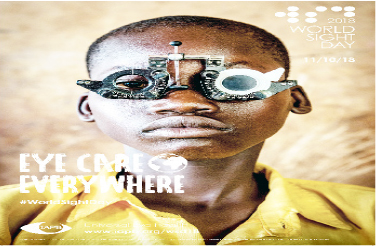
World Sight Day (WSD) is an annual day of awareness held on the second Thursday of October, to focus global attention on blindness and vision impairment. The theme for World Sight Day 2018 is ‘Universal Eye Health’ while the ‘Call to action’ is Eye Care Everywhere.
Care Everywhere emphasizes the need for accessibility to eye care services for everyone. More than 50% of sight loss is avoidable. Unfortunately, a lot of people tend to assume that the eyes will look after themselves and that they only have to worry when they can’t see clearly. This is not the case. The single most important thing we can do to avoid vision loss is to care for the eye.
The eye is regarded as the window of life and is among the most highly specialised and sensitive organs of the body. The eye is also responsible for vision and vision is one of the five senses, (others are hearing, touch, smell, and taste). Vision is regarded as the king of all. All parts of the body are equally important and should also receive proper care. Proper care for the eye starts with having regular eye examination which is vital as this can help pick up early signs of eye conditions before you’re aware of any symptoms.
Symptoms like severe/sudden eye pain, hazy, blurry or double vision, seeing rainbows around light, seeing flashes of light or bright floating spots, itching, burning or a heavy discharge in the eyes should warrant seeing an eye care specialist.
An eye care specialist will check the eyes to look out for conditions like refractive errors (long-sightedness, short-sightedness, astigmatism) which most times develop in childhood and are usually corrected by wearing glasses/contact lenses. The examination can also detect other conditions like glaucoma, cataract, macular degeneration which if detected early, can be treated and managed effectively before one develops low vision or blindness.
Blindness and low vision have dire effects on individuals, families, and communities especially in developing countries like Nigeria where infrastructure and social care services are poor.
Poor vision and blindness also have an alarming impact particularly for those living in poverty. According to the World Health Organisation, about 253 million people in the world are visually impaired, 36 million people in the world are blind and 89% of visually impaired people live in developing countries.
Countries have made some progress in the prevention and management of avoidable blindness along the lines of the “VISION 2020: The Right to Sight” initiative. However, a lot still needs to be done especially in the area of absorbing primary eye care as an integral part of the primary health care system and improving the provision of surgical services in Nigeria.
Nigeria is estimated to have about 4.25 million adults aged 40 years who are visually impaired or blind and with its ever increasing and aging population is at risk of falling further behind in the fight against eliminating avoidable blindness. Avoidable blindness is defined as blindness which could be either treated or prevented by known, cost-effective means. Unfortunately, nearly 75% of the world’s blind are avoidably blind and the first step in reversing this trend lies with you getting your eyes checked regularly and spreading the message to all the people around you. Even the Bible understands the importance of good eye health, as it says thus,
“The eyes are like a lamp for the body. If your eyes are sound, your whole body will be full of light; but if your eyes are no good, your body will be in darkness. So if the light in you is darkness, how terribly dark it will be” (Matt. 6:22-23; GNT).
Be conscious of the importance of good eye health from today, to avoid being part of the global statistics on blindness. Get in touch with an eye care professional to get tested.
Ogbonna, a primary eye care professional (Optometrist), wrote in from Lagos
END

Be the first to comment